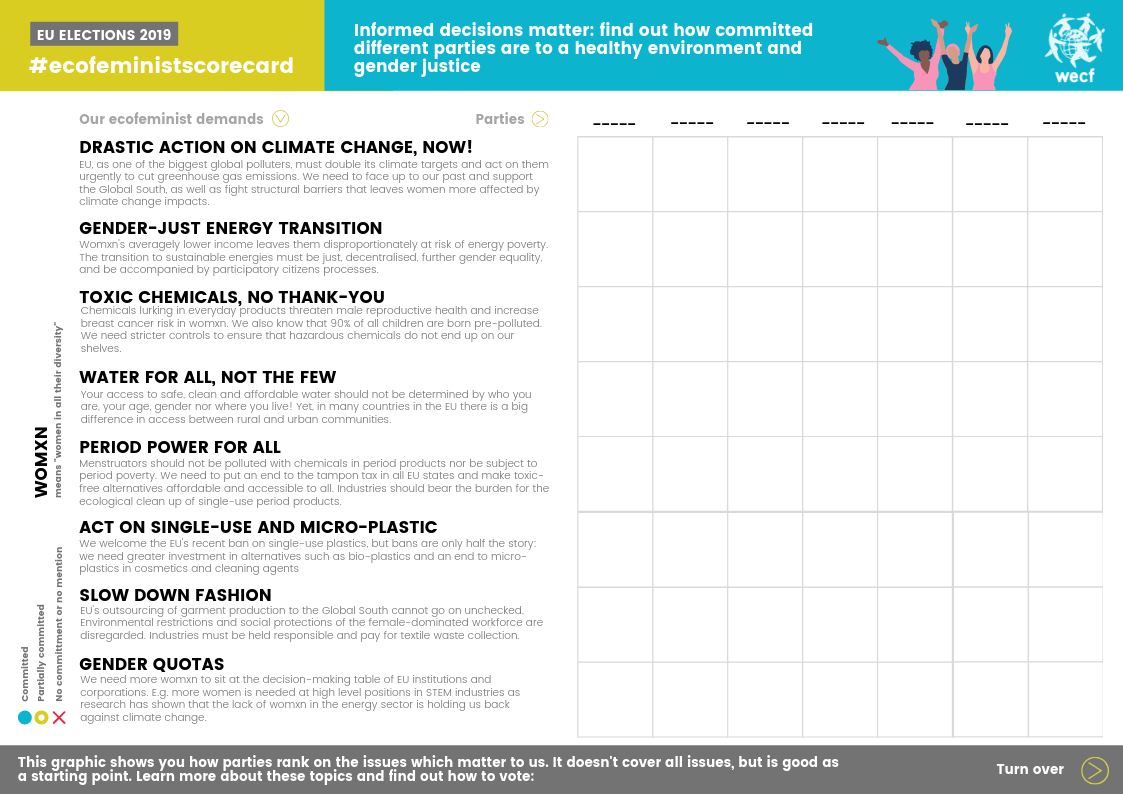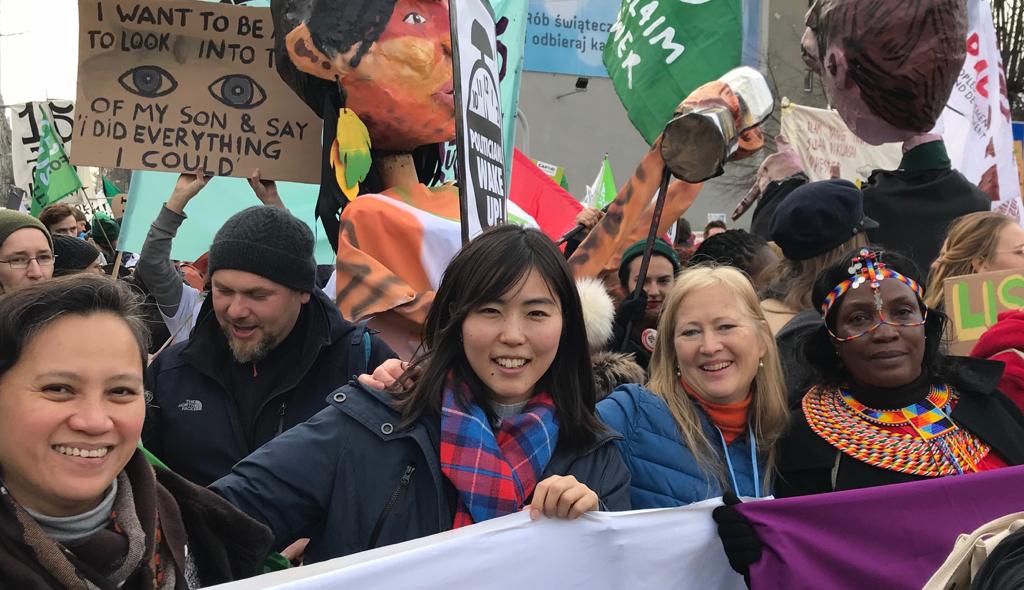An ECOFeminist Europe
We have witnessed groundbreaking environmental campaigns in recent years: Greta Thurnberg’s #fridaysforfuture fervour, the #imadeyourclothes anti-fast fashion campaign and the #environmenstrual action, not to mention the #breakfreefromplastic movement. Young womxn have mobilised in immense numbers for these environmental issues, but there is another call to action on the horizon.
The European Parliamentary Election 2019 is your next chance to stand up for the protection of equality, climate and our health. We, at WECF, decided to cut through the jargon in party manifestos and policy statements to bring you a manifesto scorecard which ranks party commitments to a gender-just and sustainable Europe. We want the #ecofeministsscorecard to be the next campaign championed by young womxn in Europe. As Greta Thurnberg’s small beginnings have shown us, an enormous amount of impact can be made through collective action.
But what exactly are we demanding? Which ecofeminist issues are important to us? What more needs to be done?
1. Stop tampons littering our beaches: We want a reform of the laws on sanitary products.
While it is welcome that some of us are already moving toward sustainable alternatives, the majority of us still rely on disposable products. All too often these end up being flushed away, making their way into our oceans and onto our beaches. A recent EU commission report provided the damning statistic that every fifth item of single use plastic on our beaches is a disposable sanitary product. If period taboos weren’t bad enough, we now also being branded plastic polluters.
The industry continues to resist attempts to accept responsibility for an ecological clean up; with threats that consumers would end up bearing the costs. To add insult to injury we still have no EU-wide end to the tampon-tax. The EU has so far reached the unhappy compromise of basic labelling requirements on products. This is yet again shifts the responsibility and guilt onto consumers. Worse still, the whole debate on sanitary products has been dogged by discomfort and awkwardness around this “taboo” topic. Politicians have been unwilling to explore the topic in greater depth out of sheer embarrassment.
It’s 2019, period taboos cannot continue to hold back accessibility to sanitary products. We want to see a Europe in which sustainable alternatives like menstrual cups are made more affordable and accessible to all menstruators.
2. No more messing with our hormones: We want to see stricter controls on the use of chemicals which threaten our reproductive health.
You might not have heard of Endocrine Disrupting Chemicals (EDC’s) but they’re everywhere in your daily life. They are found in your cosmetics, plastics bottles and the pesticides carried on your fruit and vegetables. A mounting body of evidence is showing how these chemicals are wreaking havoc with your natural hormones. Studies have shown links between exposure to EDCs and the increased risk of breast, ovarian, and endometrial cancers, not to mention impaired fertility and disorders such as endometriosis.
You might be shocked to know that the EU has been reluctant to address these health risks and have instead been prey to vicious lobbying by the chemicals industry. We want to see the EU responding with robust action against the use of these chemicals instead of further delays. Our politicians are not only thwarting protection for our reproductive health but also the well-being of the most vulnerable; unborn babies, with the impacts of EDCs being most detrimental for development of highly sensitive fetuses.
3. Slower fashion for all: We want Europe to call time on lax controls on the fast fashion industry.
Another important ecofeminist issue is the fate of womxn in the fast fashion industry. In just a number of decades, European clothing consumption has gone up by 40%. Our insatiable consumption has made us turn to cheap, disposable clothing which often ends up being thrown away. With 80% of garment workers being womxn worldwide, womxn are bearing the brunt of our consumption. They work with toxic dyes, are confronted with sexual abuse and work cripplingly long hours – all for an unlivable wage.
EU importer’s exploitation of cheap labour and low environmental standards in the Global South is continuing to go unchecked. We still do not have any kind of multilateral agreement on human rights and business practices which could secure greater implementation of checks on outsourcing. An agreement must also be accompanied by a change to our linear model of “consume-wear-dispose”. Unless we mobilise for this change, we will continue to read outrageous headlines such as that of the Burberry scandal. The EU’s next step must be to “slow fashion”; to introduce greater checks on importers, to fund research into sustainable fabrics and to enforce collection schemes to further realise our circular economy.
If European consumers wore clothing twice as often as they currently do, emissions from the garment industry could be 44% lower. Simple actions from consumers can drastically improve this waste crisis. We stress, however, that much greater focus must be put on the actions of the industry itself. Not all the blame can be apportioned to consumers.
But let’s get back to what you can do right now: get informed and getting voting.
The importance of voting in this election cannot be overstated. With the total inertia and chaos in the midst of the Brexit mayhem, issues such as the endangerment of our reproductive health, our role in responding to the apocalyptic IPCC report on the impacts of a mere 1.5 °C rise in temperature and persistent underrepresentation of womxn in STEM sectors are being swept under the carpet. We are not powerless in this mess. Get informed by reading our scorecard and register to vote in this election to decide the fate of womxn not only across Europe but globally. #ECOfeminist
*Voting requirements and deadlines for registration vary from country to country: get in the know at https://www.howtovote.eu/.




![Women in the alternative music scene in Serbia – Devojke na alternativnoj muzičkoj sceni u Srbiji [EN/SR]](https://www.youngfeminist.eu/wp-content/uploads/2015/12/Nemesis-150x150.jpg)

[…] Aktivismus bieten. Lest doch mal rein: ihr findet dort spannende Posts z.B. zu der Frage „Wie kann ich für ein ökofeministisches Europa stimmen?“ oder „Warum kann meine Stimme für ein feministisches Europa dazu beitragen, der Krieg der […]